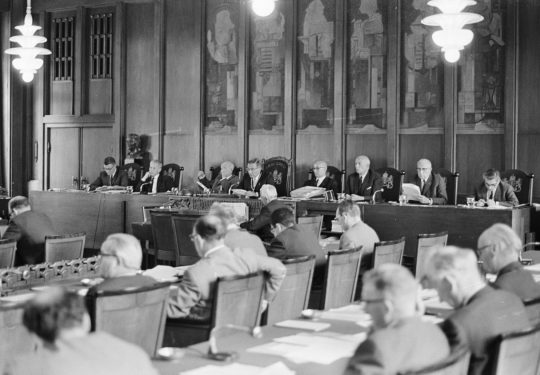Het opkomstcijfer bij de gemeenteraadsverkiezingen heeft een nieuw laagterecord behaald. Nu lokale partijen gaan onderhandelen is het van belang dat transparantie en open data een belangrijk onderdeel daarvan wordt.
Een kiezer die op 19 maart naar de stembus ging, had het volgende dilemma. Hij of zij komt aan bij het stembureau, stapt in het stemhokje, pakt het rode potlood en vraagt af hoe je tot een keuze moet komen? Op TV was een debat tussen landelijke fractieleiders. Ze hadden het over het overhevelen van taken naar gemeenten en over de laatste economische cijfers.
Achter de laptop kan de kiezer een lokale stemwijzer invullen maar beseft dat lokale verkiezingsprogramma’s slechts een verzameling beloftes zijn, zonder financiele dekking, laat staan dat ze zijn doorgerekend door het Centraal Planbureau.
Wellicht heeft de kiezer nog een poging gedaan op de website van de gemeente te zoeken naar wat de partij waarop hij vier jaar geleden de keuze liet vallen daadwerkelijk heeft gedaan maar al snel raakt hij de weg kwijt in het doolhof van notulen, besluiten en agenda’s. De natuurlijke lokale watchdogs, lokale en regionale journalisten die gemeenteraden kritisch volgen zijn er steeds minder. Redacties krimpen en de gratis huis-aan-huis-bladen hebben nauwelijks nog tijd om de lokale politiek goed te volgen.
Meer taken naar de gemeenten, meer openheid nodig
De decentralisatie, de overheveling van zware verantwoordelijkheden van het rijk naar gemeenten komt gestaag op gang. Deze nieuwe taken bestaan uit besluiten over voorzieningen maar terwijl raadsleden een zware verantwoordelijkheid hebben, kunnen ze die niet dragen, laat staan dat ze daarop aanspreekbaar zijn. Immers veel van die taken worden belegd in regionale samenwerkingsverbanden. Wie die gaat controleren is nog steeds de vraag.
Een miljoenenstrop met de bouw van een electriciteitscentrale in het Overijsselse Steenwijk, een miljoen aan gemeenschapsgeld verspild bij de verplaatsing van een woonwagenkamp in Eindhoven, miljoenen verloren met de aankoop en herontwikkeling van een haven in Bergen op Zoom zijn slechts enkele voorbeelden van miljoenen belastinggeld die de afgelopen jaren zijn verloren door besluiten van gemeenten.
En terwijl toezicht en controle falen is transparantie ver te zoeken. Als er al transparantie is dan wordt dat geregisseerd. Geef informatie terug aan burgers. Tegelijkertijd hebben hele generaties mogelijkheden om zelf te onderzoeken, ze kunnen publiceren en organiseren. De manier waarop deze generaties omgaan met autoriteit is veranderd, maar de structuur van overheidsinstellingen is precies hetzelfde gebleven.
Wat wel nieuw is, is de komst van nieuwe digitale technologieën en de verspreiding van kennis en informatie. In een land waar weinig transparantie is, kunnen burgers geen goed zicht krijgen op de werking van de overheid. Laat staan dat zij als actieve burgers volwaardig kunnen deelnemen in het publieke domein.
Overheden en semi-publieke instellingen zijn bang voor een afrekencultuur maar hoe worden voorzieningen beter als mensen niet eens weten wat deze instellingen precies doen? Als een student zijn scriptie aan een of meer studiegenoten laat lezen, zal hij of zij in eerste instantie niet blij worden van de rode strepen in zijn werk. Maar zijn scriptie wordt er wel beter van. En zo werkt het ook met transparantie. Het is geen doel op zichzelf maar stelt wel in staat om het openbaar bestuur en publieke dienstverlening beter en effectiever te maken.
Open democratische basisinformatie
Gemeenten zouden veel meer basisinformatie moeten ontsluiten als open data. Informatie over de gemeenteraad, besluiten, notulen, moties, kwartaal- en jaarcijfers kunnen relatief eenvoudig worden ontsloten als gemeenten een basis standaard hanteren en zich ervan bewust worden dat zij de opdrachtgever zijn aan leveranciers van dergelijke diensten. Uit eerder onderzoek bleek al dat het stemgedrag van gemeenteraadsleden op veel gemeente-websites moeilijk te vinden is. Bij een op de vier gemeenten is het stemgedrag van de gemeenteraad niet te herleiden uit raadsinformatie.
Op dit moment bewaren leveranciers die data in gesloten systemen en dat terwijl de gemeente eigenaar is van die data – of sterker, deze data behoort toe aan de kiesgerechtigden. Open toegankelijk betekent dat de informatie los van hoe het per gemeente gepresenteerd wordt op respectievelijke gemeente-websites zou deze data in een open formaat open en neutraal beschikbaar moeten zijn.
Openspending
Bij Nederlandse overheden is een schat aan informatie aanwezig in de financiële administratie. Begrotingen, jaarverslagen, inkomsten en uitgaven zorgen voor sturing en verantwoording binnen de overheid. Het digitaal inzichtelijk maken van deze financiële data biedt kansen om de uitgaven van overheden te toetsen en te controleren. Het biedt inzicht en op deze manier kan worden gezocht naar mogelijke kostenbesparingen en kunnen alternatieven worden aangedragen.
Voor financiele rapportages hebben gemeenten al een standaard. Echter deze data is nog niet bij elke gemeente open en vrij beschikbaar. Gemeenten leveren elk kwartaal financiele data aan het CBS in iv3-standaard. Daarin zitten begrotingen en kwartaal- en jaaruitgaven. Ook deze data kunnen ze zelf open en vrij beschikbaar stellen waardoor meer inzicht en onderlinge vergelijkingen mogelijk zijn. Via het platform openspending.nl heeft Open State Foundation het mogelijk gemaakt om deze uitgaven en inkomsten digitaal te ontsluiten en onderling te vergelijken.
